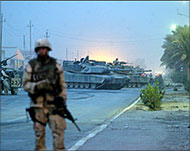Marriage proves occupational hazard in Iraq
Iraqis Joanne and Ahda fear for their lives, after marrying US soldiers who as part of the occupation force are viewed by many as the enemy.

Joanne, 26, and her best friend Ahda, 25, now live in virtual hiding, unable even to meet their new husbands, who are also under the threat of sanctions from the army.
The two women, who were working as interpreters for the US forces in a Baghdad hotel where they met their husbands, risk abduction and murder as “collaborators” with the US-led forces occupying conservative Muslim Iraq.
Their husbands, a captain and sergeant from the Florida National Guard serving with the 1st Armoured Division, could be charged with dereliction of duty for having reportedly got married while on foot patrol in Baghdad.
Misery
To add to their misery, the men are not allowed to see or speak with their brides, as “the two wives are treated like any Iraqi national who comes to the gate; they cannot get in,” according to a spokesman for the 1st Armoured Division.
 |
|
The soldiers married when they |
“But they can write letters and e-mails,” he added.
“Their duty at the time was to conduct a patrol for the safety and security of an area,” he said of the husbands.
“If they did something else while on duty, like they stopped to have lunch, then it would be a dereliction of duty. But there is an investigation and we are not aware that they have been charged.”
But the soldiers stopped for more than a bite.
Wearing army fatigues and carrying M-16 rifles, they held a double secret ceremony on 16 August after converting to Islam, reportedly because superior officers had disapproved of their decision.
Conversion
According to their marriage certificates seen by AFP, Joanne and Ahda tied the knot with Sergeant Christopher Sean Blackwell, 27, and Captain Brett Harrison Dagen, 37, respectively.
In line with Islamic law, the certificates show a payment of $1,000 by the grooms and a compensation pledge for the brides of $10,000 in case of divorce.
They also bear colour pictures of the newly weds.
At Joanne’s house, a large gate blocks access to the garden entrance.
|
“It is just bad timing. It’s not because they are Americans. Nobody gets married to a soldier from an occupying army” Ahda’s neighbour |
“Please leave. We are dead scared of being killed or having our house bombed,” pleads Joanne’s sister, standing behind the locked gate.
“We are thinking of moving house, if not leaving the country,” she whispered, apologising for “speaking in English because the neighbours are in the garden and could hear us.”
Ahda’s house is empty, but one neighbour volunteered information, although “we have been told not to speak to the press.”
Courageous
The neighbour first “guessed” the women’s marriages while listening to a radio talk show in which most contributors fiercely accused them of collaboration while a few saluted their courage.
“Their names were not mentioned, but I realised it was Ahda and Joanne from the story. I then remembered the cars, with shaded windows and armed bodyguards, that used to bring the girl home,” she said.
“When I told her I was proud of her courage, she just smiled … then she denied having been married. She is lying to protect herself,” she said.
“It is just bad timing. It’s not because they are Americans. Nobody gets married to a soldier from an occupying army,” said the neighbour, before admitting: “I love America because they make great horror movies.”